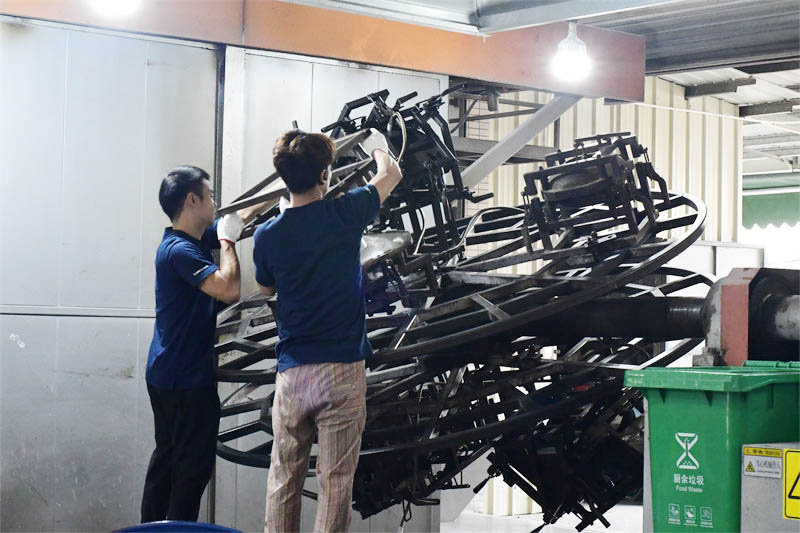What Are the Key Factors to Consider When Choosing a Rotomolding Manufacturer
 Feb 14,2025
Feb 14,2025

What Are the Key Factors to Consider When Choosing a Rotomolding Manufacturer?
Rotational molding, or rotomolding, is a versatile manufacturing process used to create a variety of durable, hollow plastic products. Whether you're producing tanks, containers, or custom components and parts, selecting the right rotomolding manufacturer is crucial to ensuring quality, efficiency, and cost-effectiveness. With so many options available, how do you choose the best partner for your project? Here are the key factors to consider when selecting a rotomolding manufacturer

1. Experience and Expertise
When evaluating a rotomolding manufacturer, their experience in the industry should be a top priority. Look for a manufacturer with a proven track record of producing high-quality rotomolded products. Experienced manufacturers are more likely to understand the nuances of the process, including material selection, mold design, and production techniques. Ask about their portfolio and whether they have worked on projects similar to yours.
2. Quality Assurance and Certifications
Quality is non-negotiable in rotomolding. A reliable rotomolding manufacturer should have robust quality control processes in place, from raw material inspection to final product testing. Certifications such as ISO 9001 are a good indicator of a manufacturer’s commitment to quality standards. Additionally, inquire about their testing procedures, such as stress testing, leak testing, and UV resistance checks, to ensure the durability of your products.
3. Material Selection and Capabilities
The choice of materials significantly impacts the performance and longevity of rotomolded products. A reputable rotomolding manufacturer should offer a wide range of material options, including polyethylene, polypropylene, and specialty resins. They should also be knowledgeable about which materials are best suited for your specific application, whether it’s for chemical resistance, UV protection, or food-grade compliance.
4. Customization and Design Support
One of the key advantages of rotomolding is its ability to produce custom shapes and sizes. A skilled rotomolding manufacture\* should provide design support to help optimize your product for the rotomolding process. This includes assistance with mold design, wall thickness, and structural integrity. Look for a manufacturer that uses advanced CAD software and prototyping tools to bring your ideas to life.
5. Production Capacity and Lead Times
Your project’s timeline is critical, so it’s important to choose a rotomolding manufacturer with the capacity to meet your production needs. Inquire about their facility size, number of machines, and workforce to gauge their ability to handle large or complex orders. Additionally, discuss lead times to ensure they can deliver your products within your required timeframe without compromising quality.
6. Cost and Value
While cost is always a consideration, it shouldn’t be the sole deciding factor. A low-cost rotomolding manufacturer may cut corners, leading to subpar products. Instead, focus on the overall value they provide, including quality, expertise, and customer service. Request detailed quotes and compare them based on the scope of work, materials, and additional services offered.
7. Customer Reviews and Reputation
A manufacturer’s reputation speaks volumes about their reliability and performance. Look for customer reviews, testimonials, and case studies to gauge their track record. A reputable rotomolding manufacturer will have positive feedback from satisfied clients and a history of delivering on their promises. Don’t hesitate to ask for references or examples of past projects.
8. Sustainability Practices
As environmental concerns grow, many businesses are prioritizing sustainability. Choose a rotomolding manufacturer that follows eco-friendly practices, such as using recyclable materials, minimizing waste, and reducing energy consumption. Sustainable manufacturing not only benefits the environment but can also enhance your brand’s reputation.
9. Location and Logistics
The location of your rotomolding manufacturer can impact shipping costs and delivery times. If you’re sourcing internationally, consider factors like import duties and transportation logistics. On the other hand, a local manufacturer may offer faster turnaround times and easier communication.
10. Customer Service and Communication
Effective communication is essential for a successful partnership. A reliable rotomolding manufacturer should be responsive, transparent, and willing to address your concerns throughout the project. Evaluate their customer service during the initial inquiry process to ensure they are easy to work with and committed to meeting your needs.
If you’re looking for a trusted rotomolding manufacturer for your custom rotomolded products, please feel free to contact us for detailed information and professional consultation.
 Tel: 0086-13632687993
Tel: 0086-13632687993  Email: roto@lightvenus.com
Email: roto@lightvenus.com

 Home
Home Why Choose Rotational Molding to Create Hollow and Complex-Shaped Plastic Products
Why Choose Rotational Molding to Create Hollow and Complex-Shaped Plastic Products  You May Also Like
You May Also Like



 Tel
Tel
 Email
Email
 Address
Address








